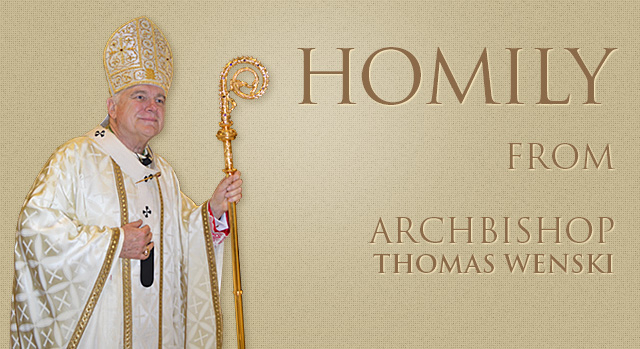By Archbishop Thomas Wenski - The Archdiocese of Miami
Homily by Archbishop Thomas Wenski at Mass for the Installation of Acolytes at Redemptoris Mater Archdiocesan Missionary Seminary. Wednesday, March 29, 2017.
In yesterday’s gospel reading, we heard of Jesus’ cure of the paralytic � a cure which took place on the Sabbath. Today’s gospel versus have Jesus giving his defense. In a sense the trial of Jesus has already begun: the Pharisees are both prosecuting him and persecuting him. So, by this time, we can already sense that Jesus’ death is a foregone conclusion.
In the second Eucharistic Prayer, the prayers of consecration begin in this way: “At the time he was betrayed and entered willingly into his passion, he took bread�” Jesus “entered willingly into his passion”. Jesus doesn’t deny the accusations leveled against him but essentially confirms them. The Pharisees condemn Jesus for breaking the Sabbath not merely because they thought him not to be taking the Jewish law seriously. Jesus was a serious Jew � and Jesus engaged the Pharisees and the people as a “rabbi” � a teacher. They condemn because in breaking the Sabbath he was essentially claiming for himself a divine prerogative. “He must die”, they would later shout out “because he made himself equal with God”. As we say in the Nicene Creed, “God from God, Light from Light, true God from true God, begotten, not made, con-substantial with the Father; through whom all things were made.”
Jesus’ special relationship to the Father is the basis of our relationship to the Father. “Whoever hears my word and believe in the one who sent me have eternal life.” And, with baptism which is already a participation in Jesus’ death and resurrection” eternal life has already begun for us. For if we hear his word and believe we have “passed from death to life”. The gospel is the good news that God is restoring our broken lives through the death and resurrection of Jesus Christ.
That passing from death to life is “re-presented” in the Paschal Meal of the New Covenant, that is, the Holy Mass. For our communion in the Body and Blood of the Lord is already a foretaste of heaven. This is why the Church teaches that the Eucharist is the source and summit of her life. The Eucharist builds up the Christian community and makes it grow. Those sharing in the ministry of acolyte have a special role in the celebration of the Eucharist. You assist priests and deacons in their ministry and as special ministers give Holy Communion to the faithful at Mass and to the sick. This is your” work” which you will do especially on the Lord’s Day, the Christian Sabbath. As Jesus explained to the Pharisees to do a good deed � like curing the paralytic � does not violate the Sabbath. Holy activities do not violate the Sabbath rest � for the Sabbath rest is not so much about rest from our mundane labor but a rest for Divine Heavenly labor.
Because you are specially called to this ministry of a Divine Heavenly labor, you should strive to live more fully by the Lord's sacrifice and to be molded more perfectly in its likeness. You should seek to understand the deep spiritual meaning of what you do, so that you may offer yourselves daily to God as spiritual sacrifices acceptable to him through Jesus Christ.
In performing your ministry bear in mind that, as you share the one bread with your brothers and sisters, so you form one body with them. Show a sincere love for Christ's Mystical Body, God's holy people, and especially for the weak and the sick. Be obedient to the commandment which the Lord gave to his apostles at the Last Supper: "Love one another as I also have loved you."

